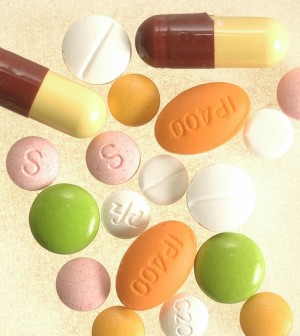- Could Your Grocery Store Meat Be Causing Recurring UTIs?
- Are You Making This Expensive Thermostat Error This Winter?
- Recognizing the Signs of Hypothyroidism
- 10 Strategies to Overcome Insomnia
- Could Artificial Sweeteners Be Aging the Brain Faster?
- Techniques for Soothing Your Nervous System
- Does the Water in Your House Smell Funny? Here’s Why
- Can a Daily Dose of Apple Cider Vinegar Actually Aid Weight Loss?
- 6 Health Beverages That Can Actually Spike Your Blood Sugar
- Treatment Options for Social Anxiety Disorder
Do ADHD Medicines Boost Substance Abuse Risk?

Parents often worry that their children who take stimulants to treat attention deficit hyperactivity disorder (ADHD) may be at higher risk for substance abuse later.
Now, a surprising new study finds that risk was actually lower when medicines such as Ritalin and Adderall were started earlier and taken longer.
“Most notably, the risk of substance use in adolescents who had been treated at an earlier age and for a longer duration with stimulant ADHD medications was the same as for the general population of children,” said study leader Sean Esteban McCabe. He is research faculty chair at the University of Michigan Institute for Research on Women and Gender.
“The study found that the odds of reporting any substance use were over two times more likely among individuals who reported later onset [age 15 or older] and shorter duration [two years or less] of prescription stimulant medication therapy for ADHD as compared to those who initiated early [age 9 or younger] and for longer duration [six years or more],” McCabe said.
The researchers evaluated more than 40,000 high school seniors, including more than 3,500 who were prescribed stimulant medication for ADHD and 1,300 who were prescribed non-stimulant medicine.
The researchers gathered information on medication use and whether or not the teens had engaged in binge drinking, cigarette smoking, marijuana or cocaine use.
“Later initiation of stimulant medication for ADHD, shorter duration of use, and the use of non-stimulant medication for ADHD were all associated with increased substance use during adolescence,” McCabe said.
But the study can’t prove cause and effect, the researchers said.
According to background information in the study, nearly one in eight high school seniors in the United States has used stimulant or non-stimulant medication for ADHD. Medication can help with the symptoms of ADHD, a brain disorder marked by hyperactivity, impulsivity and lack of attention.
While the new findings might seem counterintuitive, McCabe said the results actually reinforce the importance of early detection of ADHD and continuous treatment.
“Some experts have asserted that early detection and appropriate medication management may decrease core ADHD symptoms, such as impulsivity, and may promote adaptive behavior that could reduce substance use and substance use disorders later in life,” he said.
Another pediatrics expert agreed.
“This study provides parents and physicians with further reassuring evidence that prescribing stimulant medications to grade-school children with ADHD is not associated with an increased risk of later substance use at age 18,” said Dr. Andrew Adesman, chief of developmental and behavioral pediatrics at Cohen Children’s Medical Center of New York, in New Hyde Park.
“Although some parents have expressed the fear that Ritalin and other stimulant medications could be ‘gateway drugs’ that put children with ADHD at even greater risk for later substance abuse problems, this well-designed analysis of a large national sample clearly shows that this is not the case,” Adesman added.
While it could be possible that some of the children using the stimulant drugs later were experimenting and did not actually have ADHD, McCabe said that information was beyond the scope of the study. The findings do suggest that precautions are needed when prescribing ADHD medicines for older teens, including an assessment of substance use history and ongoing monitoring, he said.
Parents can do much to reduce the risk of substance abuse by their kids, McCabe said. If they suspect ADHD, getting their child checked out early can help get them the treatment they need. Parents can also be good role models in the use of their medicines, he said.
The study was published in the June issue of the Journal of the American Academy of Child and Adolescent Psychiatry.
More information
To learn more about ADHD, visit the U.S. Centers for Disease Control and Prevention.
Source: HealthDay
Copyright © 2026 HealthDay. All rights reserved.










